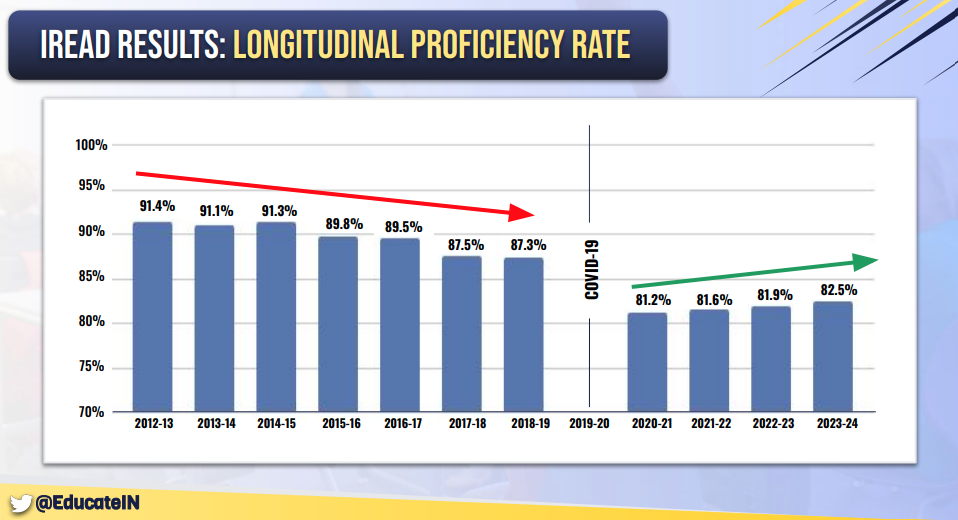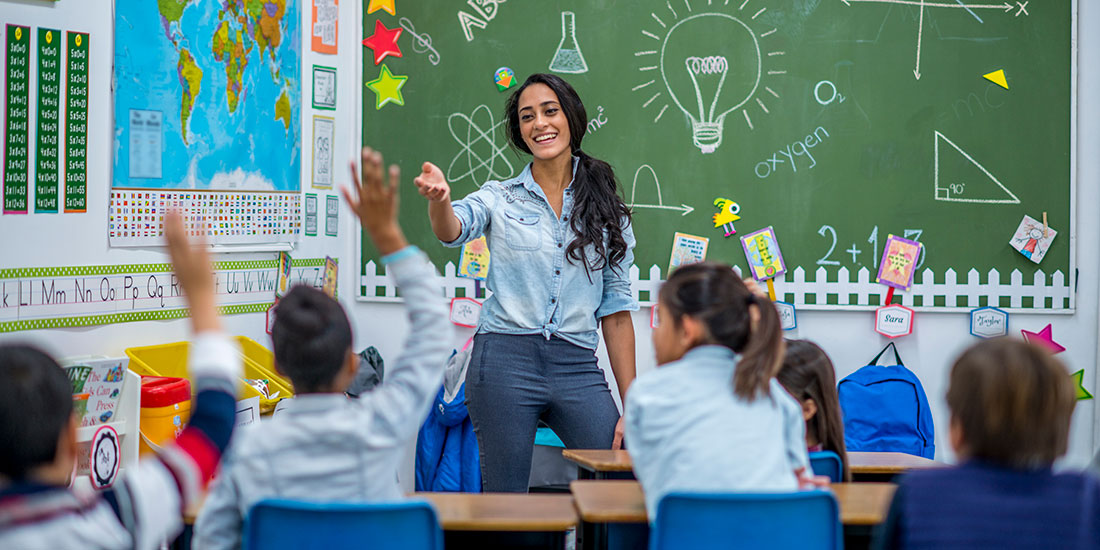IREAD-3 scores biggest jump in test history; more work ahead
Is Indiana on the way to its own “Mississippi Miracle,” in terms of increasing reading proficiency in young students? An “Indiana Miracle (?)” if you will.
Results from the 2023-24 IREAD-3 assessment show third graders earned the largest single-year increase in reading proficiency scores since the assessment launched in 2013. State leaders view this as a promising sign that efforts put forth to improve student reading skills are showing early returns on investment.
As your favorite education newsletter has been telling you, Indiana’s third grade literacy rates had been dropping for a decade, even prior to the negative academic impacts of the Covid-19 pandemic. We just started to experience an upswing only a few years ago.
Statewide, results reveal that more than 67,000 Indiana third graders – or 82.5% – demonstrated proficient reading skills on the assessment. This is an improvement of 0.6 percentage points over results for the 2022-23 school year, which is the highest year-over-year increase since the launch of IREAD.

Still, about 14,000, or 17%, of third grade students lag behind in obtaining foundational reading skills. Those students will require additional intervention to meet grade-level reading standards. Starting next school year, third graders who still can’t meet the IREAD standard after intervention and testing multiple times will be held back, per the state law (SEA 1-2024) passed this year tightening the state’s retention policy.
While education leaders are optimistic about these results, they recognize the work ahead.
As we’ve been telling you, in response to the state’s literacy decline – which was labeled a “crisis” last year by Secretary of Education Katie Jenner – state leaders have taken action. That includes Governor Eric Holcomb (R) setting an ambitious target of 95% reading proficiency for all third graders by 2027.
To achieve this, K-12 reading curricula and teacher training are switching to align with the science of reading. The science of reading emphasizes phonemic awareness, phonics, vocabulary, fluency, and comprehension.
These current literacy investments closely model Mississippi policies that created the so-called “Mississippi Miracle” in which the state’s literacy rates grew from being ranked the second-worst state in 2013 for fourth grade reading to 21st in 2022.
Though there have been skeptics as to whether other states can really replicate Mississippi’s success, with Indiana’s latest IREAD results, Secretary Jenner continues to reiterate that this is in line with following the Mississippi Miracle path.
A standout in the results related to recent state investments is the improvement in reading scores among schools in the Indiana Literacy Cadre program, which provides early elementary teachers with instructional coaching and support aligned with the science of reading. For the second cohort in 2023, 199 schools joined the cadre. For 2024, that number doubled to 489 schools.
State law mandates that schools with below 70% IREAD passing rates must join the cadre.
Literacy cadre schools saw a 2.5 percentage point increase in IREAD scores between 2023 and 2024, compared to non-cadre schools posting a 0.2 percentage point increase.
“What we’re looking at right here is an outstanding thing,” Dr. Jenner observes. “It’s unbelievably exciting because it moved the needle significantly more.”
Some of the leaders at literacy cadre schools that saw the most success shared their work during Wednesday’s State Board of Education meeting. Some of the schools enjoyed score jumps of more than 20 percentage points since joining the cadre.
Students at Pleasant Run Elementary School in MSD Warran Township, for example, passed IREAD at a 82% rate in 2024 – a significant jump from a 54% passing rate in 2021. The school’s 2024 scores are also higher than pre-pandemic.
Pleasant Run Principal Travis Koomler explains this change was achieved through a network of systems, but very much credited the literacy cadre for its support provided for the school’s teachers.
Some promising success is also seen from schools opting to test IREAD in second grade. This method is used to identify students earlier who may need extra intervention in order to be reading at grade level by the third grade.
IDOE emphasizes early intervention for second graders not reading proficiently in 2023 has been critical in the gains seen this year. Beginning this school year, all schools will start testing IREAD in second grade, per the reading law passed during the 2024 session. With the help of this early indicator, 56% of second graders who were at risk last year passed in 2024.
Al most 97% of second graders who were deemed “On Track” last year passed in 2024. Of the second grade students who participated in IREAD in 2024, 59% passed – or are on track to pass – by the end of third grade.
Second grade testing was an idea that Dr. Jenner almost shot down, she admits. With the latest results, she acknowledges she was proved wrong.
“Allowing that to be taken in grade two was in many respects, a big bet for us as a board, because it’s ‘another assessment,’ ” Secretary Jenner points out during Wednesday’s board meeting. “We allowed it to be opt-in. We saw the numbers grow with schools who opted in.”
She adds, “What an opportunity we have to turn that corner even more and get a higher percentage of students who are at-risk, passing.”
Governor Holcomb seems to be satisfied and hopeful with the progress in reading scores as well.
“The historic literacy investments we have made over the past several years are beginning to show return on investment, which is a testament to the hard work of teachers, families and students in every corner of our state,” the Governor praises. “Let’s keep this positive momentum going.”
However, racial disparities still exist in the pass rates, and IDOE recognizes that is an issue they aren’t ignoring.
Scores did improve for Black students, with a 3.2 percentage point increase from 2023 to 2024. But they still fall below the average passing rate with 68.6% passing the exam this year.
Scores for Hispanic students decreased by 0.3 percentage points. English language learners’ scores also decreased by 0.4 percentage points.
Dr. Jenner promises the department is taking a deeper dive into helping Hispanic and ELL students. “That’s an area that we’ve called out multiple times, but we have to continue to focus on our English language learners and our Hispanic students,” she asserts.
Looking ahead, expect to see literacy continue to be at the forefront in the 2025 legislative session. Dr. Jenner reveals she hopes lawmakers will see these improvements and be willing to invest more cash into literacy programs.
“I can guarantee you that literacy will be one of our priorities going into this coming session,” Dr. Jenner asserts. “Right now, we are looking at the return on investment in terms of, is it moving the needle for several different initiatives, and you’ll see me over the next several months lay out the data as it comes in, and certainly when we start in the legislative session.”
She avows, “I’ll be very open and transparent with the General Assembly on here’s what we’re seeing that’s working, here’s what we’re seeing that is not. We should totally invest the money in what working.”
Next year we will also see the first results of the state’s tightened retention policies, and whether thousands of students will have to repeat the third grade. Remember, 14,000 third graders failed to pass the IREAD this year, and close to one-half of the students who were at risk after testing in second grade in 2023 still didn’t pass the exam this year in third grade.
That could mean a whole lot of third graders staying behind for another year.

